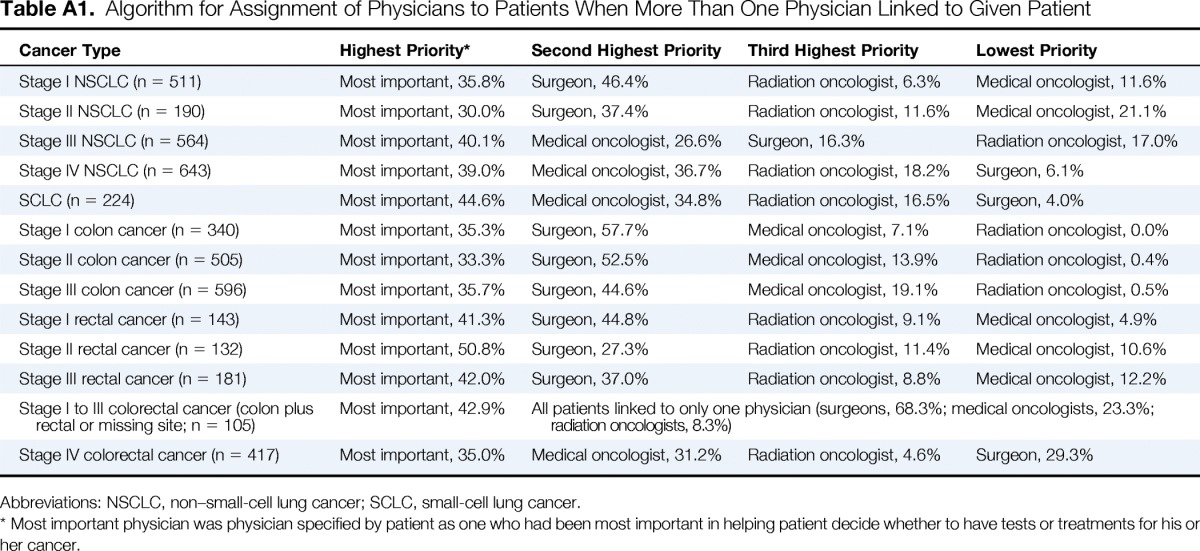Table A1.
Algorithm for Assignment of Physicians to Patients When More Than One Physician Linked to Given Patient

| Cancer Type | Highest Priority* | Second Highest Priority | Third Highest Priority | Lowest Priority |
|---|---|---|---|---|
| Stage I NSCLC (n = 511) | Most important, 35.8% | Surgeon, 46.4% | Radiation oncologist, 6.3% | Medical oncologist, 11.6% |
| Stage II NSCLC (n = 190) | Most important, 30.0% | Surgeon, 37.4% | Radiation oncologist, 11.6% | Medical oncologist, 21.1% |
| Stage III NSCLC (n = 564) | Most important, 40.1% | Medical oncologist, 26.6% | Surgeon, 16.3% | Radiation oncologist, 17.0% |
| Stage IV NSCLC (n = 643) | Most important, 39.0% | Medical oncologist, 36.7% | Radiation oncologist, 18.2% | Surgeon, 6.1% |
| SCLC (n = 224) | Most important, 44.6% | Medical oncologist, 34.8% | Radiation oncologist, 16.5% | Surgeon, 4.0% |
| Stage I colon cancer (n = 340) | Most important, 35.3% | Surgeon, 57.7% | Medical oncologist, 7.1% | Radiation oncologist, 0.0% |
| Stage II colon cancer (n = 505) | Most important, 33.3% | Surgeon, 52.5% | Medical oncologist, 13.9% | Radiation oncologist, 0.4% |
| Stage III colon cancer (n = 596) | Most important, 35.7% | Surgeon, 44.6% | Medical oncologist, 19.1% | Radiation oncologist, 0.5% |
| Stage I rectal cancer (n = 143) | Most important, 41.3% | Surgeon, 44.8% | Radiation oncologist, 9.1% | Medical oncologist, 4.9% |
| Stage II rectal cancer (n = 132) | Most important, 50.8% | Surgeon, 27.3% | Radiation oncologist, 11.4% | Medical oncologist, 10.6% |
| Stage III rectal cancer (n = 181) | Most important, 42.0% | Surgeon, 37.0% | Radiation oncologist, 8.8% | Medical oncologist, 12.2% |
| Stage I to III colorectal cancer (colon plus rectal or missing site; n = 105) | Most important, 42.9% | All patients linked to only one physician (surgeons, 68.3%; medical oncologists, 23.3%; radiation oncologists, 8.3%) | ||
| Stage IV colorectal cancer (n = 417) | Most important, 35.0% | Medical oncologist, 31.2% | Radiation oncologist, 4.6% | Surgeon, 29.3% |
Abbreviations: NSCLC, non–small-cell lung cancer; SCLC, small-cell lung cancer.
Most important physician was physician specified by patient as one who had been most important in helping patient decide whether to have tests or treatments for his or her cancer.
